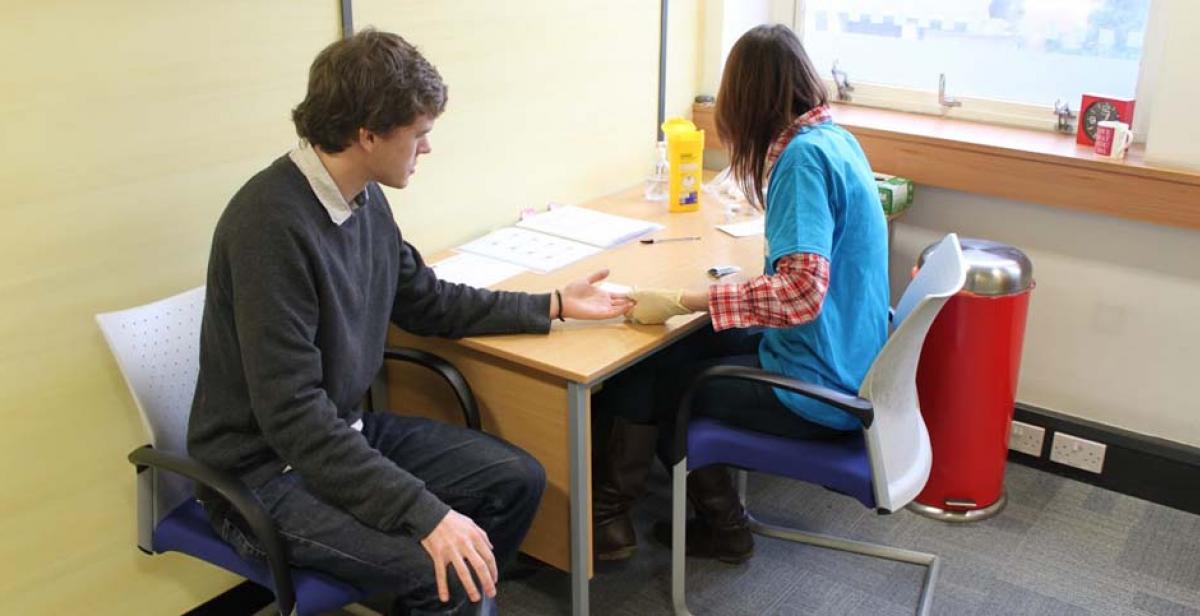Three former ICS volunteers have visited their local clinics to get tested for HIV in recognition of World AIDS Day.
Andreia Fausto, Nekisha De Costa and Thomas Inglehearn went to clinics in Leeds, London and Lilongwe (the capital of Malawi) to show solidarity with those they worked with during their ICS placement and to raise awareness about HIV and AIDS.
All three volunteers worked with Progressio in Malawi, which has one of the highest adult HIV and AIDS rates in the world. They were involved in projects aimed at educating the local community and supporting those affected.
While it might feel daunting, getting tested is a simpler process than people often expect, says Nekisha, a youth worker based in Ladbroke Grove, West London.
"The test is very quick and you can often turn up without an appointment, as I did." she says. "Once the test is finished, the results are delivered at a faster pace than ever, and are strictly confidential."
Nekisha added that, while free testing is widely available in Malawi, people living with HIV and AIDS can often face stigma and discrimination from their community. This discourages people from finding out their status.
"I take my hat off to those that step out in courage and make a decision to get a test," she says.
Andreia stayed in Malawi after her ICS placement was over and now works for a local NGO on issues including HIV and AIDS. She took the test at her local Lilongwe clinic where counselling is offered before and after testing.
"Getting tested is a deeply personal decision and one you can’t force people into," she says. "But it’s important to educate people about the benefits of getting tested because it can prevent the disease from spreading and means those affected can learn how to manage their illness."
Vastly improved medical treatment means that those treated early and effectively for HIV are increasingly able to live full and healthy lives.
"When I came to Malawi, I expected those living with HIV to look very thin and ill," says Andreia. "But I met people with so much to offer - who were full of energy, happy and smiling."
Thomas Inglehearn told us more about his experience.
"Earlier this year, I volunteered with ICS in the Malawian city of Mzuzu. Here in the UK, I live in Leeds. It’s easy to forget that HIV is a global problem, and not one restricted to the developing world, though its impact is particularly harsh there.
"While I was in Malawi, I did a lot of work related to HIV and AIDS. HIV is the single biggest killer in Malawi. My ICS team chose to focus on the importance of HIV testing. Convincing the population to visit their local clinic is an excellent way to educate people on how to protect themselves, and, in the case of those who test positive, how to protect those around them from the virus.
"Of course, we couldn’t do a proper job of advocating testing without having first-hand experience, so we went for one ourselves. The clinic we visited in Mzuzu was run by the Malawi AIDS Counselling and Resource Organisation (MACRO) and we were hugely impressed at what we saw.
"During my placement, I realised that my home-city of Leeds and Mzuzu have a lot in common. They’re both nationally significant trade hubs located in the north of countries of about the same size and with a larger, more economically powerful capital city in the south. They each have a pretty good university, lots of culture, and are surrounded by rural communities. Both cities also have an abundance of chip shops.
"This got me wondering: how do HIV tests in Leeds square with its ‘twin’ city Mzuzu? I got the train into town to find out.
"The Leeds clinic I attended was a walk-in clinic run by BHA in a building on the high street. Check them out here.
"To my surprise, the two experiences were more or less identical, down to the purple rubber gloves. The counsellors used the same blood-spot paper testing strips, and each visit was preceded by a quick talk between me and a counsellor to work out how much I already knew about the virus and what my risk factor might be.
"I would then surrender a drop of blood to be used for the test. Afterwards, when my result was in, we talked about the best way to reduce my risk factor and where to get additional support if I needed it. The staff were great, it was all very professional and, of course, 100% confidential.
"There were, however, a couple of things I noticed in Leeds that got me thinking.
"First, the Leeds clinic was a lot easier to get to. It’s easy to take regional mobility for granted when you have a solid transport infrastructure to rely on. People in Mzuzu have further to travel to get to their local clinic, and many can’t afford the K100 (17p) taxi into town, which is a huge obstacle when you consider the differences in the severity of the impact of HIV in Leeds and Mzuzu.
"Secondly (this surprised me) in Leeds you will never get a ‘positive’ HIV result outright. Instead, you’ll get a ‘reactive’ result. Rather than serving as a concrete diagnosis, this tells you whether the test has picked up HIV antibodies. If you got a positive reactive result, you would go over to the Leeds General Infirmary to have a more in-depth diagnostic investigation. Then the lab could potentially work out when you were infected and what your prognosis was likely to be."
For more on how Progressio stands alongside people living with HIV, keep scrolling

And find out how we're marking World AIDS Day here



